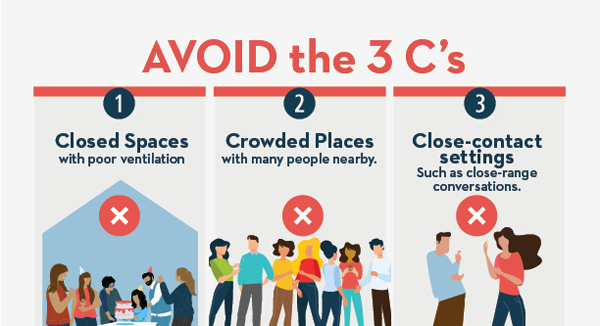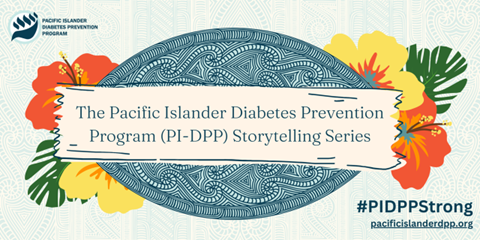Diabetes Facts
o According to the U.S. Department of Health and Human Services, Native Hawaiians and other Pacific Islanders (NHPI) are at a 2.5 increased risk of being diagnosed with diabetes than non-Hispanic white populations in 2018 (HHS, 2018).
o The Republic of the Marshall Islands (RMI) has the highest prevalence of diabetes in the world and the Federated States of Micronesia (FSM) has the world’s second highest rate of diabetes in the world.
o Coupled with geographical, historical, and economical challenges to the Pacific Islands, these factors further exacerbate the prevalence of prediabetes and diabetes among NH/PI communities.
The Pacific Islander Diabetes Prevention Program (PI-DPP) Storytelling Series
PI-DPP, is a year-long, evidence-based lifestyle change program recognized and supported by the CDC. It was formed in 2017 by the Association of Asian Pacific Community Health Organizations (AAPCHO) and Pacific Islander Center of Primary Care Excellence (PI-CoPCE). Currently, PI-DPP partners with 11 community-led organizations located throughout the U.S. and U.S. Affiliated Pacific Islands (USAPI) in pursuit of improving the health and wellness of Pacific Islander communities. Aligning with PI-DPP success standards, participants aim for 5% body weight loss, 150 weekly physical activity minutes (PAMs), and lower HbA1C values.
Oral Storytelling is a fundamental tradition among many Pacific Islander cultures, ensuring stories and history are passed down from generation to generation. That’s why program leads from each PI-DPP site will talk story about PI-DPP’s importance, community impact, challenges and best practices, and next steps for their diabetes prevention programs.
Stay updated on stories by visiting https://pacificislanderdpp.org/our-stories and following AAPCHO’s Facebook, Instagram, Medium, and Twitter. To learn more about PI-DPP’s sites and how to get involved, please visit https://pacificislanderdpp.org/ for more information!
Vaccine Information for Children and Adolescents
CDC Recommendations
- HPV (human papillomavirus)
- Quadrivalent meningococcal conjugate vaccine (MenACWY and MenB) (Meningococcal disease)
- Tdap (tetanus, diphtheria, and pertussis)
- Influenza (flu)
- Varicella (chickenpox)
- COVID-19 (2 doses)
School Requirements
- Polio
- Tdap (tetanus, diphtheria, and pertussis)
- MMR (measles, mumps, and rubella)
- Hepatitis B
- Varicella (chickenpox)
Vaccines are recommended to protect children from diseases. The above vaccines are available at physician offices, community clinics, and many retail pharmacies. People without medical insurance can get vaccinated at one of the six County locations; call 2-1-1 for a location nearest you.
For more information on vaccines, call the HHSA Immunization Branch at (866) 358-2966 or visit www.sdiz.org
Find a Doctor
How to find a primary care doctor by zipcode/city and insurance status:
How to find a pediatrician by zipcode/city and insurance status:
You can also call 2-1-1 or the number on the back of your insurance card for a doctor nearest you.
NHPI Data
Social Determinants of Health (SDOH) include: housing, education, socioeconomic status, ability/disability, insurance status, immigration status, and more. Learn about the impact of SDOH on Native Hawaiian and other Pacific Islander communities here:

NPIEN Members and Friends,
We wish everyone, students, families, teachers and all school staff the very best during the school year.
- How to find a Doctor
- Search for primary care doctors.
- How to find a Pediatrician
- Look for pediatricians.
- What Vaccinations do my children need?
- Visit here for vaccinations.
- How are you feeling? How is your Mental Health? Everyone, take deep breaths, and take five steps backward before you act out of emotion or stress and tell yourselves, “We can do this together.” Listen to music, dance, sing (only at home), exercise and talk to one another about your how you are feeling. Enjoy this extended family time. Check-in with friends and loved ones on the phone.
- Join us for Aloha Music and Mindfulness Thursdays 12:00-12:20 p.m. Twitch https://twitch.tv/ukulele_dad
- Contact the Cal Hope Warm Line if you need to speak to someone about stress, Telephone or Text (833) 317-HOPE (4673) https://calhope.dhcs.ca.gov/
- Dealing With Difficult Times Read about what you can do to deal with stress and trauma, nine steps
- New Zealand’s Pasifika Mental Health Resource Page. While there are resources specific to New Zealand citizens, there are also a number of resources tailored to Pasifika which would be useful to us here
- Nona Palmer’s favorite is a link to the Le Va website, which features really cool PI-specific COVID mental/emotional health resources such as their Talanoa to Connect Factsheet, Respectful Relationships Factsheet, and Trouble in your Bubble? Factsheet.
- Nutrition/Food, Housing, Employment, Transportation Try 211 which is a guide to all of the resources you will need. There is a 2-11 number is every county https://www.211la.org/ Cities and Schools also have great information.
- Finance/Business Assistance/Grants/Loans
- https://www.lacovidfund.org/
- NPIEN recently sponsored a Small Business Administration Workshop https://www.sba.gov
- Need Help from your School or School District? As every State and County has different guidelines, contact the school office or school district office for information on the Reopening of School, Child Care, Expanded Learning/After School Programs, Athletics and other areas.
- In Los Angeles County, the Los Angeles County Office of Education can help if you cannot connect with your school district. Every county has an Office of Education in California. https://www.lacoe.edu/
- Stanislaus County Office of Education https://www.stancoe.org/
- Riverside County Office of Education https://www.rcoe.us/
- San Diego County Office of Education https://www.sdcoe.net/Pages/Home.aspx
- In other states contact the State Department of Education
- Washington State Board of Education https://www.sbe.wa.gov/
- Utah State Board of Education https://www.schools.utah.gov/
- Missouri Department of Elementary and Secondary Education https://dese.mo.gov/
STAY SAFE: Follow the three “C's” Avoid Crowded places, confined spaces, and close contact

Maintain social distancing and avoid large crowds. If you are ill from the flu, cold, etc. stay home and consider conferring with a doctor. Use hand sanitizer, wash your hands frequently, and clean areas such as tables, counters and door knobs. Maintain your health. If you are healthy, this is a major way to combat the virus. Be aware of high risk individuals such as Seniors, Diabetics and those with other health conditions. Public Health reminds us to follow three “C's:” Avoid Crowded places, confined spaces, and close contact with others not in your household.
NEED MORE HELP? Your NPIEN BOARD AND STAFF MEMBERS are experienced school teachers, counselors and administrators who can help. Contact us at

